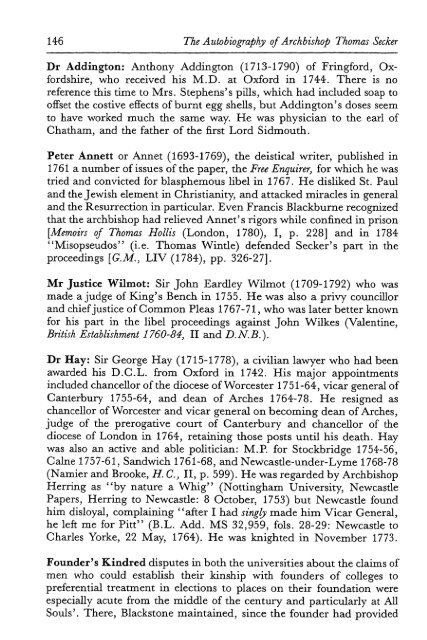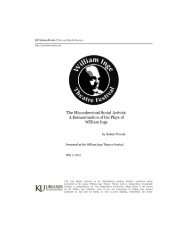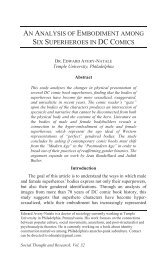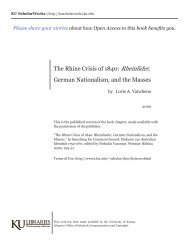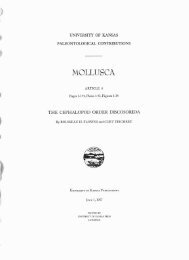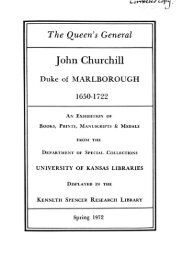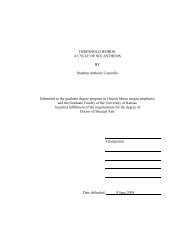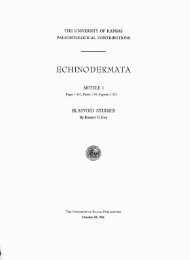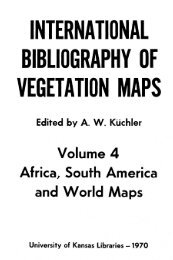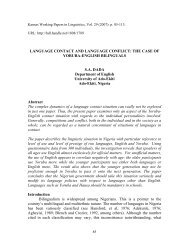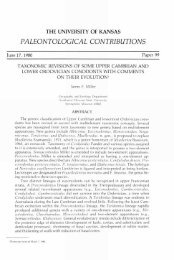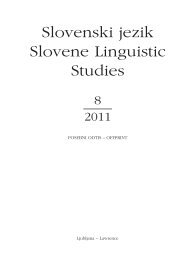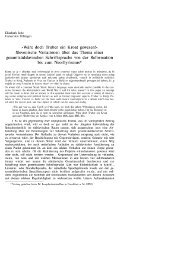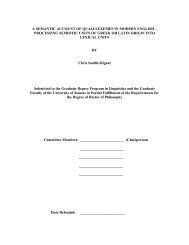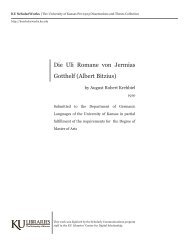Archbishop of Canterbury - KU ScholarWorks - The University of ...
Archbishop of Canterbury - KU ScholarWorks - The University of ...
Archbishop of Canterbury - KU ScholarWorks - The University of ...
You also want an ePaper? Increase the reach of your titles
YUMPU automatically turns print PDFs into web optimized ePapers that Google loves.
146<br />
<strong>The</strong> Autobiography <strong>of</strong> <strong>Archbishop</strong> Thomas Seeker<br />
Dr Addington: Anthony Addington (1713-1790) <strong>of</strong> Fringford, Oxfordshire,<br />
who received his M.D. at Oxford in 1744. <strong>The</strong>re is no<br />
reference this time to Mrs. Stephens's pills, which had included soap to<br />
<strong>of</strong>fset the costive effects <strong>of</strong> burnt egg shells, but Addington's doses seem<br />
to have worked much the same way. He was physician to the earl <strong>of</strong><br />
Chatham, and the father <strong>of</strong> the first Lord Sidmouth.<br />
Peter Annett or Annet (1693-1769), the deistical writer, published in<br />
1761 a number <strong>of</strong> issues <strong>of</strong> the paper, the Free Enquirer, for which he was<br />
tried and convicted for blasphemous libel in 1767. He disliked St. Paul<br />
and the Jewish element in Christianity, and attacked miracles in general<br />
and the Resurrection in particular. Even Francis Blackburne recognized<br />
that the archbishop had relieved Annet's rigors while confined in prison<br />
[Memoirs <strong>of</strong> Thomas Hollis (London, 1780), I, p. 228] and in 1784<br />
"Misopseudos" (i.e. Thomas Winde) defended Seeker's part in the<br />
proceedings [GM., LIV (1784), pp. 326-27].<br />
Mr Justice Wilmot: Sir John Eardley Wilmot (1709-1792) who was<br />
made a judge <strong>of</strong> King's Bench in 1755. He was also a privy councillor<br />
and chief justice <strong>of</strong> Common Pleas 1767-71, who was later better known<br />
for his part in the libel proceedings against John Wilkes (Valentine,<br />
British Establishment 1760-84, II and D.N.B.).<br />
Dr Hay: Sir George Hay (1715-1778), a civilian lawyer who had been<br />
awarded his D.C.L. from Oxford in 1742. His major appointments<br />
included chancellor <strong>of</strong> the diocese <strong>of</strong> Worcester 1751-64, vicar general <strong>of</strong><br />
<strong>Canterbury</strong> 1755-64, and dean <strong>of</strong> Arches 1764-78. He resigned as<br />
chancellor <strong>of</strong> Worcester and vicar general on becoming dean <strong>of</strong> Arches,<br />
judge <strong>of</strong> the prerogative court <strong>of</strong> <strong>Canterbury</strong> and chancellor <strong>of</strong> the<br />
diocese <strong>of</strong> London in 1764, retaining those posts until his death. Hay<br />
was also an active and able politician: M.P. for Stockbridge 1754-56,<br />
Calne 1757-61, Sandwich 1761-68, and Newcastle-under-Lyme 1768-78<br />
(Namier and Brooke, H. C, II, p. 599). He was regarded by <strong>Archbishop</strong><br />
Herring as "by nature a Whig" (Nottingham <strong>University</strong>, Newcastle<br />
Papers, Herring to Newcastle: 8 October, 1753) but Newcastle found<br />
him disloyal, complaining "after I had singly made him Vicar General,<br />
he left me for Pitt" (B.L. Add. MS 32,959, fols. 28-29: Newcastle to<br />
Charles Yorke, 22 May, 1764). He was knighted in November 1773.<br />
Founder's Kindred disputes in both the universities about the claims <strong>of</strong><br />
men who could establish their kinship with founders <strong>of</strong> colleges to<br />
preferential treatment in elections to places on their foundation were<br />
especially acute from the middle <strong>of</strong> the century and particularly at All<br />
Souls'. <strong>The</strong>re, Blackstone maintained, since the founder had provided


